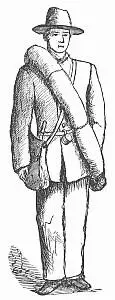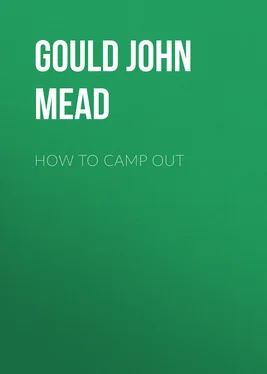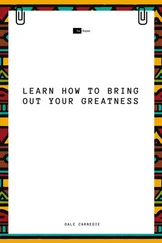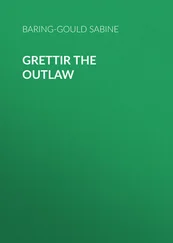John Gould - How to Camp Out
Здесь есть возможность читать онлайн «John Gould - How to Camp Out» — ознакомительный отрывок электронной книги совершенно бесплатно, а после прочтения отрывка купить полную версию. В некоторых случаях можно слушать аудио, скачать через торрент в формате fb2 и присутствует краткое содержание. Жанр: Хобби и ремесла, foreign_home, Биология, на английском языке. Описание произведения, (предисловие) а так же отзывы посетителей доступны на портале библиотеки ЛибКат.
- Название:How to Camp Out
- Автор:
- Жанр:
- Год:неизвестен
- ISBN:нет данных
- Рейтинг книги:4 / 5. Голосов: 1
-
Избранное:Добавить в избранное
- Отзывы:
-
Ваша оценка:
- 80
- 1
- 2
- 3
- 4
- 5
How to Camp Out: краткое содержание, описание и аннотация
Предлагаем к чтению аннотацию, описание, краткое содержание или предисловие (зависит от того, что написал сам автор книги «How to Camp Out»). Если вы не нашли необходимую информацию о книге — напишите в комментариях, мы постараемся отыскать её.
How to Camp Out — читать онлайн ознакомительный отрывок
Ниже представлен текст книги, разбитый по страницам. Система сохранения места последней прочитанной страницы, позволяет с удобством читать онлайн бесплатно книгу «How to Camp Out», без необходимости каждый раз заново искать на чём Вы остановились. Поставьте закладку, и сможете в любой момент перейти на страницу, на которой закончили чтение.
Интервал:
Закладка:
Fishing-tackle.
Flour (prepared).
Frying-pan.
Guide-book.
Half-barrel.
Halter.
Hammer.
Hard-bread.
Harness (examine!).
Hatchet.
Haversack.
Ink (portable bottle).
Knives (sheath, table,
pocket and butcher.)
Lemons.
Liniment.
Lunch for day or two.
Maps.
Matches and safe.
Marline.
Meal (in bag).
Meal-bag (see p. 32 If you have the choice of wagons, take one that is made for carrying light, bulky goods, for your baggage will be of that order. One with a large body and high sides, or a covered wagon, will answer. In districts where the roads are mountainous, rough, and rocky, wagons hung on thoroughbraces appear to suit the people the best; but you will have no serious difficulty with good steel springs if you put in rubber bumpers, and also strap the body to the axles, thus preventing the violent shutting and opening of the springs; for you must bear in mind that the main leaf of a steel spring is apt to break by the sudden pitching upward of the wagon-body. It has been my fortune twice to have to carry large loads in small low-sided wagons; and it proved very convenient to have two or three half-barrels to keep food and small articles in, and to roll the bedding in rolls three or four feet wide, which were packed in the wagon upon their ends. The private baggage was carried in meal-bags, and the tents in bags made expressly to hold them; we could thus load the wagon securely with but little tying. For wagons with small and low bodies, it would be well to put a light rail fourteen to eighteen inches above the sides, and hold it there by six or eight posts resting on the floor, and confined to the sides of the body. Drive carefully and slowly over bad places. It makes a great deal of difference whether a wheel strikes a rock with the horse going at a trot, or at a walk.
).
Medicines.
Milk-can.
Molasses.
Money ("change").
Monkey-wrench.
Mosquito-bar.
Mustard and pot.
Nails.
Neat's-foot oil.
Night-shirt.
Oatmeal.
Oil-can.
Opera-glass.
Overcoat.
Padlock and key.
Pails
Paper.
" collars.
Pens.
Pepper.
Pickles.
Pins.
Portfolio.
Postage stamps.
Postal cards.
Rope.
Rubber blanket.
" coat.
" boots.
Sail-needle.
Salt.
" fish.
" pork.
Salve.
Saw.
Shingles (for plates).
Shirts.
Shoes and strings.
Slippers.
Soap.
Song-book.
Spade.
Spoons.
Stove (utensils in bags).
Sugar.
Tea.
Tents.
" poles.
" pins.
Tooth-brush.
Towels.
Twine.
Vinegar.
Watch and key.
CHAPTER II
SMALL PARTIES TRAVELLING AFOOT AND CAMPING
We will consider separately the many ways in which a party can spend a summer vacation; and first we will start into wild and uninhabited regions, afoot, carrying on our backs blankets, a tent, frying-pan, food, and even a shot-gun and fishing-tackle. This is very hard work for a young man to follow daily for any length of time; and, although it sounds romantic, yet let no party of young people think they can find pleasure in it many days; for if they meet with a reverse, have much rainy weather, or lose their way, some one will almost surely be taken sick, and all sport will end.
If you have a mountain to climb, or a short trip of only a day or two, I would not discourage you from going in this way; but for any extended tour it is too severe a strain upon the physical powers of one not accustomed to similar hard work.
AFOOT.—CAMPING OUT
A second and more rational way, especially for small parties, is that of travelling afoot in the roads of a settled country, carrying a blanket, tent, food, and cooking-utensils; cooking your meals, and doing all the work yourselves. If you do not care to travel fast, to go far, or to spend much money, this is a fine way. But let me caution you first of all about overloading, for this is the most natural thing to do. It is the tendency of human nature to accumulate, and you will continually pick up things on your route that you will wish to take along; and it will require your best judgment to start with the least amount of luggage, and to keep from adding to it.
You have probably read that a soldier carries a musket, cartridges, blanket, overcoat, rations, and other things, weighing forty or fifty pounds. You will therefore say to yourself, "I can carry twenty." Take twenty pounds, then, and carry it around for an hour, and see how you like it. Very few young men who read this book will find it possible to enjoy themselves, and carry more than twenty pounds a greater distance than ten miles a day, for a week. To carry even the twenty pounds ten miles a day is hard work to many, although every summer there are parties who do their fifteen, twenty, and more miles daily, with big knapsacks on their backs; but it is neither wise, pleasant, nor healthful, to the average young man, to do this.
Let us cut down our burden to the minimum, and see how much it will be. First of all, you must take a rubber blanket or a light rubber coat,—something that will surely shed water, and keep out the dampness of the earth when slept on. You must have something of this sort, whether afoot, horseback, with a wagon, or in permanent camp. 2 2 A German officer tells me that his comrades in the Franco-Prussian war of 1870-1 had no rubber blankets; nor had they any shelter-tents such as our Union soldiers used in 1861-5 as a make-shift when their rubbers were lost. But this is nothing to you: German discipline compelled the soldiers to carry a big cloak which sheds water quite well, and is useful to a soldier for other purposes: but the weight and bulk condemn it for pleasure-seekers.

For carrying your baggage you will perhaps prefer a knapsack, though many old soldiers are not partial to that article. There are also for sale broad straps and other devices as substitutes for the knapsack. Whatever you take, be sure it has broad straps to go over your shoulders: otherwise you will be constantly annoyed from their cutting and chafing you.
You can dispense with the knapsack altogether in the same way that soldiers do,—by rolling up in your blanket whatever you have to carry. You will need to take some pains in this, and perhaps call a comrade to assist you. Lay out the blanket flat, and roll it as tightly as possible without folding it, enclosing the other baggage 3 3 In general it is better to put the shelter-tent in the roll, and to keep out the rubber blanket, for you may need the last before you camp. You can roll the rubber blanket tightly around the other roll (the cloth side out, as the rubber side is too slippery), and thus be able to take it off readily without disturbing the other things. You can also roll the rubber blanket separately, and link it to the large roll after the manner of two links of a chain.
as you roll; then tie it in a number of places to prevent unrolling, and the shifting about of things inside; and finally tie or strap together the two ends, and throw the ring thus made over the shoulder, and wear it as you do the strap of the haversack,—diagonally across the body.
The advantages of the roll over the knapsack are important. You save the two and a half pounds weight; the roll is very much easier to the shoulder, and is easier shifted from one shoulder to the other, or taken off; and you can ease the burden a little with your hands. It feels bulky at first, but you soon become used to it. On the whole, you will probably prefer the roll to the knapsack; but if you carry much weight you will very soon condemn whatever way you carry it, and wish for a change.
Читать дальшеИнтервал:
Закладка:
Похожие книги на «How to Camp Out»
Представляем Вашему вниманию похожие книги на «How to Camp Out» списком для выбора. Мы отобрали схожую по названию и смыслу литературу в надежде предоставить читателям больше вариантов отыскать новые, интересные, ещё непрочитанные произведения.
Обсуждение, отзывы о книге «How to Camp Out» и просто собственные мнения читателей. Оставьте ваши комментарии, напишите, что Вы думаете о произведении, его смысле или главных героях. Укажите что конкретно понравилось, а что нет, и почему Вы так считаете.











